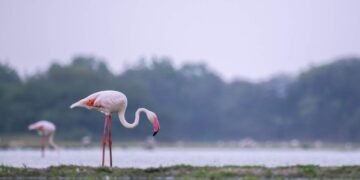India’s newly elected wildlife board, in its first meeting post-election, has given the green light to controversial power projects that affect two of the country’s vital ecological areas — Gujarat’s flamingo habitat and Goa’s Mollem forest. The decision has raised alarms among environmentalists, who fear irreparable damage to the region’s biodiversity.
Impact on Gujarat’s Flamingo Habitat
One of the key projects approved involves the construction of transmission lines through Gujarat’s renowned flamingo habitat. This area is a crucial breeding ground for the vibrant flamingo population, attracting migratory birds from various parts of the world. Conservationists worry that the construction of these transmission lines could disturb the delicate balance of the ecosystem, potentially leading to a decline in flamingo numbers.
Threat to Goa’s Mollem Forest

The Mollem National Park in Goa, another region affected by the wildlife board’s decision, is home to rich biodiversity, including several endangered species. The approval of transmission lines through this forested area has sparked widespread protests from activists and environmentalists. The Mollem forest is part of the Western Ghats, a UNESCO World Heritage site, and the project could disrupt the natural habitat of several species, some of which are already at risk of extinction.
Environmental Concerns and Protests
Environmental groups have been quick to voice their disapproval of the wildlife board’s decision, arguing that the projects could have long-term ecological consequences. They stress the importance of preserving these habitats, not only for the wildlife but also for the role they play in maintaining the region’s ecological balance. Activists are calling for a reassessment of the approvals, urging the government to explore alternative solutions that do not compromise the environment.
Government’s Response
Despite the concerns, the government has defended the decision, citing the need for infrastructure development to meet the growing energy demands of the region. Officials claim that proper measures will be taken to minimize environmental damage and ensure that wildlife is protected during the construction phase. However, conservationists remain skeptical, insisting that the environmental impact could be far greater than anticipated.
The wildlife board’s decision to approve these transmission lines in ecologically sensitive areas has sparked a debate between development and conservation. As these projects move forward, the challenge will be to balance infrastructure growth with the preservation of India’s rich wildlife heritage.
The Hindustan Herald Is Your Source For The Latest In Business, Entertainment, Lifestyle, Breaking News, And Other News. Please Follow Us On Facebook, Instagram, Twitter, And LinkedIn To Receive Instantaneous Updates. Also Don’t Forget To Subscribe Our Telegram Channel @hindustanherald








































